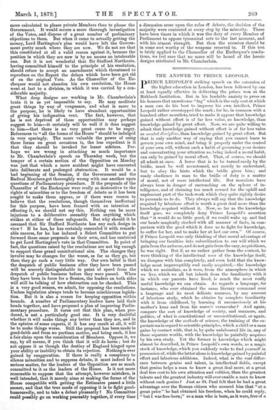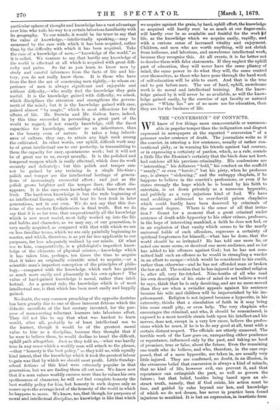THE ANSWER TO PRINCE LEOPOLD.
PRINCE LEOPOLD'S striking speech on the extension of the higher education in London, has been followed by one at least equally effective in delivering the prizes won at the Birkbeck Institution. But in his laudable anxiety to press on his hearers that unwelcome "fag" which is the only cost at which a man can do his best to improve his own intellect, Prince Leopold rather overstepped the mark ; for he, in common with a hundred other moralists, tried to make it appear that knowledge gained without effort is of far less value, as knowledge, than knowledge gained by great effort. Now, we are quite willing to admit that knowledge gained without effort is of far less value as mental discipline, than knowledge gained by great effort. But that is only another way of saying that you cannot learn to govern your own mind, and bring it properly under the control of your own will, without such a habit of governing your desires and concentrating your attention as, being indeed a moral habit, can only be gained by moral effort. That, of course, we should all admit at once. A horse that is to be turned easily by the bridle, must be well accustomed, not merely to understand, but to obey the hints which the bridle gives him ; and ready obedience in man to the bridle of duty is a matter of moral, not of mere intellectual life. But moralists have always been in danger of encroaching on the sphere of in- telligence, and of claiming too much reward for the uphill and unpleasant part of the task-work which they quite rightly desire to persuade us to do. They always will say that the knowledge acquired by laborious effort is worth a great deal more than the knowledge acquired without it. Now, so far as the knowledge itself goes, we completely deny Prince Leopold's assertion that "it would do us little good, if we could wake up and find our heads magically stocked with all manner of facts, in com- parison with the good which it does us to fight for knowledge, to suffer for her, and to make her at last our own." Of course, if Prince Leopold was only thinking of that moral advantage of bringing our faculties into subordination to our will which we gain from the arduous, and do not gain from the easy, acquisitions, he was right. But if, as we rather gather from the context, he were thinking of the intellectual uses of the knowledge itself, we disagree with him completely, and even hold that the know- ledge most imperceptibly and easily acquired,—the knowledge which we assimilate, as it were, from the atmosphere in which we live, which we all but inherit from the familiarity with it in which our parents have lived, is much the most really useful knowledge we can obtain. As regards a language, for instance, who ever obtained the same literary command over a language and its most delicate nuances, by any amount of laborious study, which he obtains by complete familiarity with it from childhood, by learning it unconsciously at his mother's knee and from his nurse's vernacular ? And again, compare the sort of knowledge of society, and manners, and politics, of what is constitutional or unconstitutional, or again, the knowledge of the methods of science, the training of the ex- pectations in regard to scientific principles, which a child or a man gains by contact with, that is, by quite unlaboured life in, any of these separate worlds, with the knowledge he painfully acquires by his own study. Yet the former is knowledge which might almost be described, in Prince Leopold's own words, as a magic stock of knowledge, which you suddenly wake to find yourself in possession of, while the latter alone is knowledge gained by painful effort and laborious additions. Indeed, what is the real differ- ence between genius and talent, in intellectual fields, except that genius helps a man to know a great deal more, at a great deal less cost to his own attention and volition, than the greatest talents and the greatest industry will ever enable a man to know without such genius ? Just as St. Paul felt that he had a great advantage over the Roman citizen who assured him that "at a great price" he had obtained his freedom, when he could reply, "but I was free-born;" so a man who is born, as it were, free of a
particular sphere of thought and knowledge has a vast advantage over him who toils his way to a certain laborious familiarity with
its geography. To our minds, it would be far truer to say that
the value of knowledge,—intellectually speaking,—may be measured by the ease with which it has been acquired, rather than by the difficulty with which it has been acquired. Take the case of a knowledge of men,—" knowledge of the world," as it is called. We venture to say that hardly any knowledge of the world is effectual at all which is acquired with great diffi- culty and pains. So far as you learn to know men by study and careful inferences from the facts of life and his-
tory, you do not really know them. It is those who have from the first the art of construing men rightly,—to whom ex- perience of men is always significant and enjoyable and without difficulty,—who really find the knowledge they gain useful. It is the knowledge gained with difficulty, we admit, which disciplines the attention and strengthens the govern- ment of the mind; but it is the knowledge gained with ease, gained almost "by magic," which is most efficacious for the affairs of life. Mr. Darwin and Mr. Galton have, indeed, by this time succeeded in persuading a great part of the world to regard, if not exactly knowledge, still the finest capacities for knowledge, rather as an inheritance, than as the bounty even of nature. It takes a long inherit- ance of culture, they say, to attain any high rank among the cultivated. In other words, our uphill, difficult work may be of great intellectual use to our posterity, in transmitting to them the capacity for easy, spontaneous work ; but it will not be of great use to us, except morally. It is the polished and tempered weapon which is really effectual, which does its work securely and delicately ; but this polish and temper can- not be gained by any training in a single life-time ; polish and temper are the intellectual heritage of genera- tions of increasingly successful effort ; and just as the polish grows brighter and the temper finer, the effort dis- appears. It is the easy-won knowledge which bears the most fruit. The hard-won knowledge is but the rude beginning of an intellectual lineage, which will bear its best fruit in later generations, not in our own. We do not say that this doc- trine of the modern Evolutionists is final truth. But we do say that it is so far true, that unquestionably all the knowledge which is now most useful, most fully worked up into the life and habits and character, as we may say, of our generation, is very easily acquired, as compared with that with which we are on less familiar terms, which we are only painfully beginning to master, and which, therefore, is as yet far less applicable to our purposes, far less adequately realised by our minds. Of what use to him, comparatively, is a philologist's imperfect know- ledge of the elements of physical science,—knowledge which it has taken him, perhaps, ten times the time to acquire that it takes an originally scientific mind to acquire,—or a scientific man's imperfect conception of the principles of philo- logy,—compared with the knowledge which each has gained so much more easily and pleasantly in his own sphere? The value of hard-gained knowledge is moral, rather than intel- lectual. As a general rule, the knowledge which is of most intellectual use, is that which has been most easily and happily gained.
No doubt, the very common preaching of the opposite doctrine has been greatly due to one of those innocent fictions which the didactic moralists of the last century invented, for the pur- pose of manceuvring reluctant learners into laborious effort. They did not like to say that what was hardest to learn would, after all, probably be of least intellectual use to the learner, though it would be of the greatest moral value to him as a discipline, because they thought that if he were to believe them, he would decline to tread the difficult, uphill path altogether. Just as they told us,—what was hardly true in any sense which a worldly man will attach to the phrase, —that "honesty is the best policy," so they told us, with equally kind intent, that the knowledge which it took the greatest labour to gain was that by which we should most profit. Little Sunday- school fictions of this kind were extremely popular in that generation, but we are finding them all out now. We know now
that if a man values worldly success more than he values his own spotlessness of character, he will not find complete honesty the best worldly policy for hint, but honesty in such degree only as comes up to the average level of the honesty of the world in which he happens to move. We know, too, that though, for purposes of moral and intellectual discipline, no knowledge is like that which
we acquire against the grain, by hard, uphill effort,the knowledge so acquired will hardly ever be so much at our finger-ends, will hardly ever be so available and fruitful for the work !of life, as the knowledge which we acquire easily, rapidly, and. with a curious sense of increased vitality and enjoyment. Children, and men who are worth anything, will not shrink from toilsome, and laborious, and unwelcome intellectual work, because they recognise this. At all events, it is far better not to deceive them with false statements. If they neglect the uphill part of education, they will never have the same pliancy of mind, the same power to do what they will, the same control over themselves, as those who have gone through the hard work of self-education will be able to exert. And that is the true end to put before men. The use of hard, uphill, unwelcome work is its moral and intellectual training. But the know- ledge gained by it will never be as available, as will the know- ledge gained easily, by the exercise of apt faculty or natural genius. "White lies" are of no more use for education, than they are for the business of life.



































 Previous page
Previous page